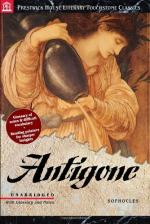|
This section contains 692 words (approx. 3 pages at 300 words per page) |

|
Antigone: Elements of a Tragedy
Summary: Analyzes the tragic elements of the play, Antigone. Defines the four major conflicts of a tragedy. Provides examples of those conflicts in Antigone.
The play Antigone displays many qualities that make it a great tragedy. A tragedy is a play in which the main character engages in a morally significant struggle ending in ruin or disappointment. In other words, the major character is not successful. There are four key components that make up this tragic play. The first would be church vs. state, the second is the divine right of the king, the third is the irony involved, and the fourth would be Creon's final blunder.
The conflict of church vs. state is a major part of the plot of Antigone. In the beginning of the play, Creon decided not to bury the body of his dead nephew Polyneices. He proclaimed throughout his city that whoever buries Polyneices will be stoned to death. Creon hoped that this would stop any disagreements and would establish peace in Thebes. He was wrong, though...
|
This section contains 692 words (approx. 3 pages at 300 words per page) |

|


